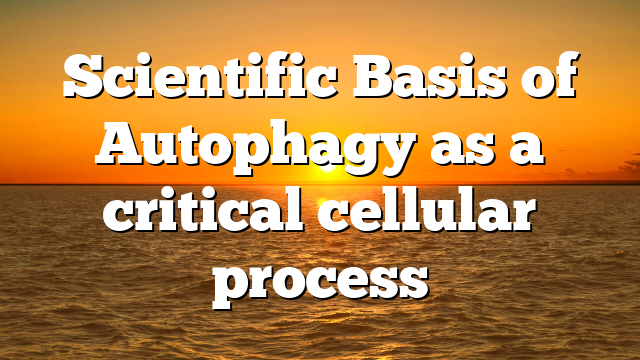Autophagy is a critical cellular process by which cells degrade and recycle their own components, enabling survival under stress and promoting overall health and longevity. This process garnered widespread attention when Yoshinori Ohsumi received the Nobel Prize in Physiology or Medicine in 2016 for his groundbreaking discoveries elucidating the mechanisms behind autophagy, establishing its fundamental importance in physiology, disease, and aging. Importantly, autophagy can be potently activated by interventions such as fasting for 16 hours or more, linking ancient dietary practices to contemporary biomedical science through mechanisms that clear damaged cells and restore cellular homeostasis.
The Scientific Basis of Autophagy
Autophagy, derived from the Greek “auto” (self) and “phagein” (to eat), refers to the self-digestion of cellular components to maintain balance and protect against damage. During this process, cellular organelles and proteins are sequestered into double-membrane vesicles called autophagosomes, which then fuse with lysosomes where their contents are broken down and recycled. Ohsumi’s pivotal research in the early 1990s, primarily in yeast models, identified the genes crucial for autophagy and clarified their roles in both normal and stressed conditions, laying the foundation for a vast expansion of research in higher organisms including humans.
The role of autophagy extends to numerous physiological and pathological contexts. It supports cellular adaptation to starvation, removes dysfunctional organelles and proteins, and clears invasive pathogens. Defective autophagy is now known to contribute to a range of disorders including neurodegenerative diseases, cancer, metabolic syndrome, and infections.
Fasting and the Induction of Autophagy
One of the most striking insights from contemporary research is the pivotal role of fasting in triggering autophagy, reconnecting modern science with ancient practices such as intermittent fasting and caloric restriction. Scientific studies demonstrate that periods of fasting (commonly 12-24 hours) suppress key nutrient-sensing pathways such as mTOR (mechanistic target of rapamycin), thereby lifting the molecular brake on autophagy and allowing cells to initiate self-cleaning and repair processes.
-
Experimental evidence in animals and humans reveals that fasting enhances the expression of autophagy-related genes and increases autophagic flux in multiple tissues, including the brain and liver.
-
Specific studies demonstrate that fasting upregulates critical autophagy mediators such as LC3, BECN1, and SIRT1, while reducing pro-inflammatory factors and promoting metabolic adaptation.
-
The activation of autophagy through fasting is associated with a reduction in age-related pathologies, improvement in neuronal health, and extended lifespan in various model organisms.
In clinical and preclinical studies, intermittent fasting and caloric restriction have shown promise for supporting cancer therapy by making cancer cells more vulnerable to stress and therapeutic interventions via enhanced autophagy activation.
Autophagy, Aging, and Disease
Autophagic activity has a direct impact on aging and age-related diseases. With age, the efficiency of autophagy declines, resulting in the accumulation of damaged proteins and organelles, which contributes to cellular dysfunction, neurodegeneration, and cancer. Enhancing autophagy through dietary interventions like fasting can delay aging phenotypes and mitigate related diseases by supporting cellular quality control, reducing oxidative damage, and promoting metabolic health.
Sustained research continues to clarify the therapeutic potential of autophagy modulation, not only for longevity but also for the prevention and treatment of chronic illnesses such as cardiovascular disease, diabetes, and various forms of cancer. Therefore, autophagy stands at the intersection of basic molecular biology and translational medicine, with fasting serving as a practical means to harness this evolutionarily conserved survival mechanism.
References
-
Nobel Prize in Physiology or Medicine 2016 Press Release, NobelPrize.org
-
“Fasting for Health and Longevity: Nobel Prize Winning Research on Cell Aging,” Blue Zones
-
“The Beneficial and Adverse Effects of Autophagic Response to Fasting,” PMC
-
“The Role of Intermittent Fasting in the Activation of Autophagy,” PMC
-
“Hallmarks of Aging: An Autophagic Perspective,” PMC
-
“Autophagy in healthy aging and disease,” Nature
-
“Spermidine is essential for fasting-mediated autophagy and longevity,” Nature
-
“Impact of Intermittent Fasting on Survival and Gene Expression,” ACS Omega
-
Additional references as cited above for targeted claims
In summary, the discovery of autophagy and its activation by fasting forms a crucial link between ancient traditions and cutting-edge biomedical understanding, underpinning promising strategies for promoting healthy aging and combating chronic disease through cellular self-renewal mechanisms.

Leave a Reply